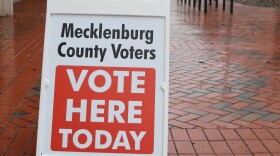A Republican-backed bill passed by the North Carolina House on Tuesday would give legislators appointment power over the state elections board and possibly soothe a partisan grudge that GOP lawmakers have held since 2020.
That year, the bipartisan state elections board, with a majority of Democrats, unanimously approved a legal settlement over a lawsuit filed by voting rights advocacy groups to ease absentee ballot rules amid the COVID-19 pandemic. The settlement resulted in a temporary six-day extension of a grace period for counting mail-in ballots postmarked by Election Day.
GOP lawmakers assailed the settlement as a collusive agreement between Democratic Gov. Roy Cooper's administration and national Democratic Party interests behind the lawsuit.
Under current state law, the board is a five-member, bipartisan body, appointed by the governor from lists submitted by the chairs of North Carolina's two largest political parties. And governors get to pick three members from their own party — mostly Democrats over the course of the state's history.
The new bill, passed on a party-line vote in the Republican-majority chamber on Tuesday, would change the board to an eight-member body with two appointees each selected by the majority and minority party leaders in both chambers of the North Carolina General Assembly, which has been controlled by Republicans since 2011.
Rep. Destin Hall, R-Caldwell, Watauga, who chairs the House Rules Committee and urged the members of his chamber to support the bill, said he did not think it was possible to find anyone to serve on elections boards without some partisan leaning.
"So, the only way we can remedy that is by creating an even number of folks on each side on this board," Hall said. "And that makes them have to try to reach some compromise before they make a decision."
Some deadlocked issues would go to legislators
More importantly, for the purposes of administering elections — and presiding over whether, or how deeply, partisanship seeps into that realm — if the even-numbered board deadlocks on the issue of appointing an executive director and chairperson, those choices would fall to the legislature.
The proposed legislation would also saddle lawmakers with the responsibility of appointing members to four-member local elections boards in the state's 100 counties.
The new four-member makeup of local boards has voting rights advocates concerned because of a provision in state law dealing with plans for early voting sites.
According to current statute, when county elections boards cannot unanimously adopt an early voting plan, they can turn to the state board. But if no plan is adopted by a majority of the state board either, the default would be just one early voting site: the local elections office.
Elections board bill could affect early voting

Ann Webb, the policy director for Common Cause North Carolina, said she is troubled by a nightmare scenario where voters in a large county like Mecklenburg would have to funnel into just one early voting site.
In 2020, Mecklenburg County had more than 365,000 people cast early, in-person votes at 34 sites.
Webb warned that reducing that to just one site in a large county like Mecklenburg or Wake would cause chaos.
"And frankly, the ultimate result would be disenfranchisement," she added.
Webb added that such a scenario could impede ballot access for early voters in rural counties too, where they might have to drive long distances to get to the one polling place.
GOP lawmakers have been down this road before
In 2016, just after Roy Cooper defeated Republican Pat McCrory in that year's gubernatorial race — but before Cooper took office that following January — GOP legislators rewrote state law pertaining to elections administration.
That law dismantled the five-member elections board and recast it as an eight-member body with combined oversight authority over elections and ethics in state government. And the governor would have to appoint four members each from lists provided by the chairs of the state's two largest political parties.
Cooper fought the law in court and ultimately got it thrown out by a 4-3 majority on the State Supreme Court.
The majority, then made up of liberals, found legislators had violated the State Constitution's separation of powers by encroaching on the governor's authority over an executive agency.
Rep. Pricey Harrison, D-Guilford, addressed that legal history in remarks she made from the House floor on Tuesday criticizing the new legislation.
"I'm confounded about why we're trying again except I know the political realities of the body here," Harrison said. "I think that elections deserve non-partisan administration and I fear that we're not headed that way with this legislation."
The court's three conservative justices dissented. Two of them — Chief Justice Mark Martin and Associate Justice Barbara Jackson — disagreed that lawmakers had overstepped their bounds because the governor had not lost all his appointment power under the legislation.
However, the third conservative justice, Paul Newby, said the issue was a political question and, therefore, one that courts had no role in adjudicating.
Newby is now the chief justice on the North Carolina Supreme Court, where Republicans hold a 5-2 majority. That does not bode well for any legal challenges that might be filed in state court over the new GOP legislation.
Since the House modified the legislation, it goes back to the Senate, where it originated, for ratification.








